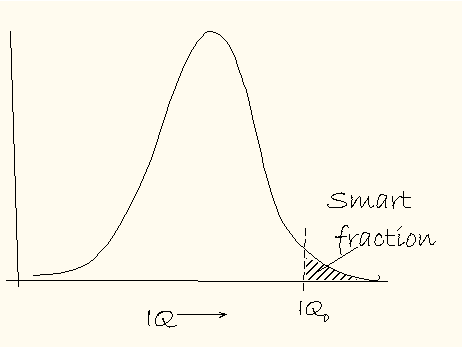
I had a very interesting discussion with a friend this past week about something called "The Smart Fraction". The theory goes like this. On a nation-state level, per capita GDP and mean IQ correlate pretty well - even better if you exclude a few reasonable outliers like Qatar for its oil revenue and Barbados for tourism. This is true whether the economy is an advanced economy or a developing economy, and is independent of the size of the population.
Without making your eyes glaze from the math, the basic "Smart Fraction" theory states that in order to maintain a modern "developed" economy, you need a certain percentage of people with a higher than average IQ (average being the global average) to do those jobs that require an excess of intelligence.
Civil engineers, systems designers, doctors, chemists, bankers , software engineers and many other intellectually demanding jobs make up a set percentage of any modern economy. And the number of these jobs required to sustain your modern economy scales with population. So if the percentage of your population that meets that requirement is below a certain threshold, then there simply aren't enough of them to keep a modern economy going. Either you import the 'smart' people from elsewhere, or things just 'don't work'.
I had to confess, this had never occurred to me. I always assumed that if you have enough people you have enough smart people. But the data would reasonably lead one to believe otherwise. Think about Nigeria for example. It's Africa's most populous country and I know from personal experience that there are a ton of REALLY smart Nigerians. I've met dozens and worked with many on and off throughout my career. I'm exposed to brilliant Nigerians all the time. But the IQ of Nigerians is below the global average. And even though there are a great many brilliant Nigerians, the percentage of the population that's brilliant is actually quite small.
Since the percentage of smart people in Nigeria isn't high enough, they can't sustain a modern economy. Meanwhile, Nigerian culture is still dominated by it's lower than (global) average mean IQ. So instead of those brilliant Nigerians staying home and inventing Africa centric Facebook Apps, founding Lagos based Venture Capital firms, or developing the Nigerian pharmaceutical industry, they spend their time trying to figure out how to steal from one another, inventing online inheritance scams, or fleeing to London or NY where their brilliance will be rewarded.
As you can probably imagine, I found the idea very interesting.
So for a the sake of argument let's accept that premise - that a modern economy requires a certain percentage of above average IQ people working in highly productive positions in order to sustain it. If that's so, then I think this raises an interesting question about the future of our economy here in the US, particularly if we extrapolate the current socioeconomic trends. Imagine for instance that instead of doing productive things in the private sector, a great many of our intelligent people are deciding that there is a better future for them working in government instead. Government does not require a higher than average IQ (as is evidence by most of Congress), but it's employees can game the system to arrange for higher compensation than a free market would provide them. So instead of adding value to the economy, they only add rules for others.
Suppose at the same time, we also put social welfare programs in place that hand out a comfortable existence to anyone who applies - essentially importing a huge population of people who may not be below average, but are certainly not a part of the "Smart Fraction". Both of these policies will drive the 'smart fraction' down, lowering the per capita GDP. Theoretically it could be lowered enough to drive the world's dominant economy out of the 'developed world' and into the third world.
This is a long way from the most likely scenario of course, but it's at least reasonable speculation. But roughly a third of our population can't even discuss it (and must declare it an unspeakable heresy) because it represents uncomfortable truths for them. It's too ... controversial... too awkward. It points to facts that they are emotionally incapable of facing.
But that doesn't make the facts any less persuasive. And for those of us who are able to rise about our sentiments on such issues, I think there is opportunity in accepting the truth before others can. I think there is money to be made on this information. I'm not quite there yet, but I'm thinking about it. And I've found that people are able to accept anything if it is both 1: The Truth, 2: Profitable to them.
Maybe that's the key to accepting the facts on the issue of IQ heritability.

No comments:
Post a Comment